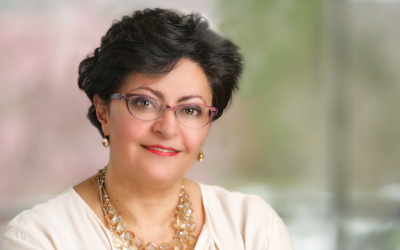Advocacy is no longer a "nice to have." The pharmaceutical industry is moving away from a time when advocacy simply meant transmitting information about diseases and available treatments to patients. We are moving to an era of close collaboration between the company and the patient community where patient voices have an increasing impact on everything from research and drug development to treatment access. They are influential from the conception of a compound all the way to the marketplace and beyond.
Daiichi Sankyo brought Gissoo DeCotiis on board in 2018 when it centralized its global advocacy work under one umbrella to create consistency and a patient centric mindset across the entire organization. She now serves as Head of Global Advocacy for the company. Ms. DeCotiis is focused on making sure patient voices are being heard every step of the way. To understand the unmet needs of patients, she and her team are building strong relationships with advocates around the world. She started with the company just as Daiichi Sankyo was getting ready to introduce its first cancer treatment in many years, due to the dramatic refocus of the company to oncology. Ms. DeCotiis has increased advocacy engagements the company has in the oncology field exponentially.
Here, Ms. DeCotiis discusses the important role that patient engagements play in bringing recognition to Daiichi Sankyo as a global leader in oncology—one with an unwavering commitment to patients.
Experts in Their Own Diseases
Traditionally, researchers of pharmaceutical drugs focus on the science and may rarely, if ever, come in contact with a patient. The patients, on the other hand, live day and night with their disease. Many people with cancer know what it's like to be part of clinical research, have weighed the risk against the benefits of the treatments and research studies they are offered, and likely have strong preferences related to their quality of life.
"From the patient perspective, we have heard loud and clear they would like to be involved," Ms. DeCotiis said. "Clinical research, for example, might require patients to travel three times a week to the cancer center to give blood. Patients will speak up to explain what a burden such a requirement presents and may even pass on registering for the study as a result."
By listening to the patients, Ms. DeCotiis explained, the company might be able to offer alternatives within the study protocol, perhaps allowing a patient's local physician to draw the blood needed for the study or have studies that are conducted closer to where patients live.
 |
The patient voice is stronger than ever, and patients have much to say about their expected quality of life and survival aspirations.
- Gissoo DeCotiis, Head of Global Advocacy at Daiichi Sankyo |
Closing the Knowledge Gap
It is no longer enough to print a pamphlet about a new study or clinical research. With so much information available to patients in the United States through the internet, data needs to be made available quickly and presented using language which can be understood by a lay population. In order to close the gap between the data and what patients desire to know, Daiichi Sankyo is working with the original authors of scientific peer reviewed articles to write them in lay terms, making access to science available for cancer patients. This is a relatively new strategy which can have a considerable impact on patients, Ms. DeCotiis explained.
"I used to hear about patients who would take a journal article and read it word for word using a dictionary and, at the end, they still wouldn't fully understand," she said. "Ideally, the day will soon come when an article in a peer-reviewed medical journal, such as The New England Journal of Medicine, and a lay translation are published simultaneously."
The "Fly on the Wall" Approach
Through advocacy, Daiichi Sankyo engages with patient communities in a number of ways, including one-on-one discussions, advisory boards and patient events. But sometimes, simply being a "fly on the wall" can be tremendously effective. This has been demonstrated through patient-provider exchanges where Daiichi Sankyo has no involvement in the exchanges other than listening and learning from patients.
"We were able to learn a lot through these unincumbered discussions," Ms. DeCotiis said. "Patients felt comfortable asking physicians their burning questions and expressing their deepest desires."
A Global Commitment
In order to increase the Advocacy team's reach and impact, Ms. DeCotiis established a Patient Focused Forum—a network of advocates which includes Daiichi Sankyo representatives from the many countries where the company has a presence. This global strategy, which includes a standard operating procedure and policy for engaging with the patient community, is disseminated all the way down to the local country level.
"Best practices are shared, and ideas are exchanged freely so everyone can learn from one another," Ms. DeCotiis said. "For example, the successful patient lunch-and-learn webinars offered in the U.S., where patients are invited to share their stories with employees of the company, will soon be introduced in Europe."
The Patient Focused Forum is also supporting country level colleagues to establish a network of patient focused individuals so that they can determine the infrastructure needs in order to engage local patient advocacy organizations and bringing the patient voice into their processes to help employees better understand what the patients' lived experience is like in countries around the world.